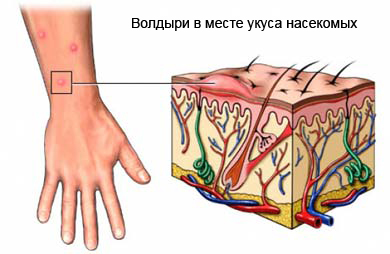Kiss type allergy
Description of allergy to insect stings
Allergy – abnormal or adverse reaction to certain substances. Allergy to insects – reaction to insect bites. It can also occur when exposed insects in the environment.

Causes of allergies to insect stings
Allergies can cause stings or other effects of various insects
Biting Insects:
- Bees;
- This;
- Hornets;
- Bumblebees;
- Ants.
Blood-sucking insects:
- Midge;
- Fleas;
- Slepni;
- Mosquitoes;
- Mosquitoes.
Insects, that cause respiratory allergies:
- Cockroaches;
- Midge;
- Flies;
- Caddisflies.
Risk factors for allergies to insect stings
Factors, that increase the likelihood of developing an allergy to insect bites:
- Age: children's;
- The presence of other types of allergies, including hay fever;
- The presence of family members, allergies;
- Professional activity, associated with the contacts of insect;
- The presence of dust in the environment and insect allergens.
Symptoms of allergies to insect stings
Symptoms include:
- Skin rash;
- Hives;
- Itch;
- Swelling;
- Redness;
- Fever.
Anaphylaxis can be life-threatening reaction to a bite, and can cause:
- Every rash, krapivnicu, itch, swelling in the area of the bite;
- Swelling of the lips, language, person, throat, and eyelids;
- Shortness of breath, shortness of breath, cough, crepitation;
- Dizziness, swoon;
- Severe low blood pressure;
- Respiratory problems and / or cardiac arrest.
Some insects cause respiratory allergies, which result in:
- Cold;
- Sneezing;
- Cough;
- Breathlessness;
- Shortness of breath;
- Hripota.
Diagnosis of allergy to insect stings
The doctor performs a physical examination and asked about dealing with insects, cause allergies. Most diagnoses are based on the reaction after an insect bite. For patients with severe allergy insect bites can be life-threatening. The doctor may refer the patient to an allergist or immunologist. This doctor, who specializes in allergies.
Analyses Commission, and include:
Each sample
The doctor puts a small protein particles or diluted insect venom on the body, usually on the forearm or back, then a fine needle makes a scratch. If there is swelling or redness, Allergic reactions may be present. The doctor diagnoses, based on symptoms and skin test. Some skin tests can have a severe allergic reaction, life-threatening. This test should be performed only under the supervision of a physician or other trained medical personnel. If you have severe eczema results of this test hard to interpret.
RAST or ELISA tests
Your doctor may order a blood test (GROWTH – radioallergosorbent test or ELISA – Enzyme immunoassay). These tests measure the level of IgE in blood proteins. IgE is a type of protein, which the body produces, when brought into contact with an allergen. The presence of IgE in the blood may indicate allergic.
Treatment of allergies to insect stings
Some allergic reactions cause trouble breathing. If this happens, you should immediately call the ambulance.
Treatment may include:
- Adrenaline – introduced immediately in case of a severe, a life-threatening reaction (anaphylaxis);
- Admission antihistamines – to reduce the swelling and itching;
- Ice – It is applied to the area of the sting, to reduce swelling;
- Corticosteroids – in severe tumors, zude, mucus from the nose, and sneezing;
- Bronchodilators – inhalers, which may be used, asthma attacks to lessen (symptoms, like wheezing, cough, and shortness of breath;
- Immunoterapija jadami – a series of techniques a small amount of the allergen, so that the body gradually loses sensitivity to insect bites, usually bees, OS, Hornets, or ants.
Prevention of allergies to insect stings
To reduce the likelihood of an allergic reaction to insect bites is necessary:
- Avoid stinging insects;
- Be careful, when working in the garden, in the garden, while hiking in the woods;
- Do not walk barefoot;
- With careful use of perfume. It can attract stinging insects;
- Wearing clothes covering the body;
- Consider immunotherapy (allergy shots). This can reduce reactions to insect stings;
- If there is severe, anaphylactic allergy to stings, you need to see a doctor, to get a dose of adrenaline (typically syringe), and carry it with you for emergencies.
To reduce the chance of reactions to insect, that cause respiratory allergies necessary:
- Avoid carpeting, curtains or other fabrics, that may gather dust in the house, especially in the bedroom;
- Often wet cleaning;
- Regularly wash clothes in hot water;
- Regularly vacuum the cushions, coverings and mattresses.
